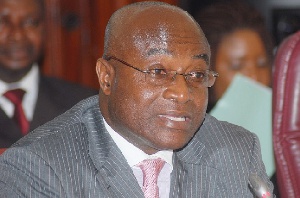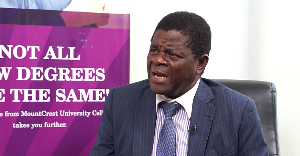Mr Osei Kyei-Mensah-Bonsu, Majority Leader and Minister of Parliamentary Affairs, has attributed the high attrition rate of Members of Parliament (MPs) to the increasing monetization of internal party politics.
This he said was proving detrimental to parliamentary work.
He urged political parties to do serious introspection as this practice of opening the gates at the end of every four years was not advancing Ghana’s democracy in any way.
Mr Kyei-Mensah-Bonsu made these remarks in his presentation at the Centre for Social Democracy (CSD) Ghana’s Public Forum on “Parliamentary Oversight and Good Governance” in Accra.
The forum was organised by the CSD in partnership with the Political Science Department of the University of Ghana, with support from the Friedrich Ebert Stiftung.
On capacity building of MPs, Mr Kyei-Mensah-Bonsu said: “Members of Ghana’s Parliament must themselves understand the principles of responsibility, equality before the law and urgent need to develop, imbibe and foster a culture of rejection of corruption and impunity.
“Parliament and Parliamentarians understanding their work simply means capacitating Parliament and Parliamentarians. Building the capacity of Parliamentarians is not a one-year or even four-year event. It requires time,” he added.
He said: “It is not for nothing that any objective assessment of performance of MPs in Ghana would yield the names of Papa Owusu Ankamah, Dr Benjamin Kunbour, W. O Boafo – all former Members, Alban Bagbin, Doe Adjaho (the former Speaker) Dr Anthony Akoto Osei, and need I add my humble self as very knowledgeable and experienced and prolific debaters and law-makers.”
“These people are not instant products, they are men of the days before yesterday,” the Majority Leader stated.
On the structure of Parliamentary Committees, Mr Kyei-Mensah-Bonsu said it was self-evident that Parliament was as strong as its Committees make it.
He cited that one of the most high profile Committees in Parliament was the Public Accounts Committee.
“A cardinal reason for its strength is that it is chaired by a minority member. By statutes it is only the Public Accounts Committee that is so structured,” he said.
With regards to the fight against corruption, Mr Kyei-Mensah-Bonsu said it was important that Ghanaians acknowledged that prevention, detection and fight against corruption and healing, reviving and uplifting the instruments for good democratic governance was a responsibility of all stakeholders including groups outside the public sector such as Civil Society Organizations, and Community-Based Organizations.
“Many people recognised the deficit in the oversight responsibility of Parliament. Notwithstanding, correcting the deficiencies in the system should be a collective responsibility even though, admittedly, the role of Parliament is, admittedly very huge,” Mr Kyei-Mensah-Bonsu noted.
“Parliament is capable of elevating its performance since, as we have seen, a lot of the problems are self-inflicted,” he stated.
Mr Antonio Edem Asinyo, Fellow, CSD – Ghana, said the objective of the forum was to critically examine the oversight function of Parliament within the context of promoting good governance and fighting corruption.
Business News of Thursday, 5 October 2017
Source: ghananewsagency.org

















